10 “Bad” Habits That Can Actually Be Good for You BY BARBARA K. ADAMSKI ( courtecy ,- reader's digest )
- লিঙ্ক পান
- X
- ইমেল
- অন্যান্য অ্যাপ
10 “Bad” Habits That Can Actually Be Good for You
Don't believe everything you hear. These bad behaviors can actually be good for you.
Computer games
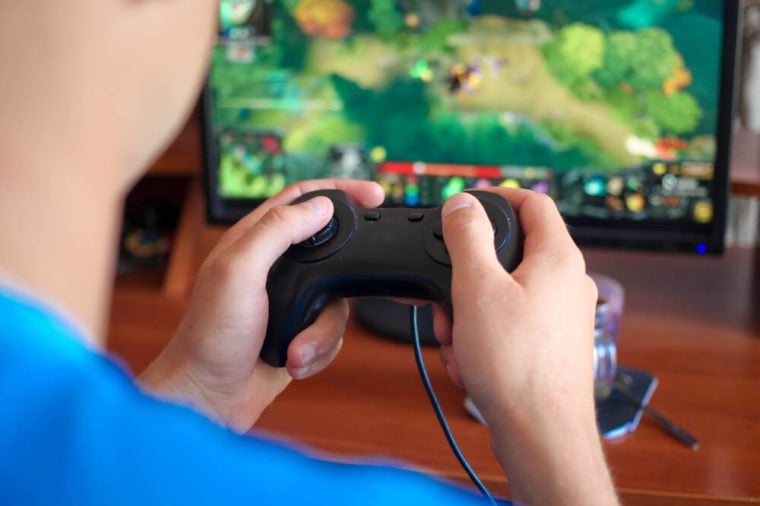 IRYNA TIUMENTSEVA/SHUTTERSTOCK
IRYNA TIUMENTSEVA/SHUTTERSTOCK
They isolate children socially and distract them from learning, right? Think again. Researchers have found that kids who clock up regular console time can improve their hand-eye coordination, their grip on science, even their IQ.
A British study of 700 children found that simulation games developed children's strategic thinking and planning skills. And researchers from the Department of Computing Science at the University of Alberta suggest that computer games can be a great way to explain physics concepts. Their game Siege integrates the concept of projectile movement and brings the effects of wind velocity and vertical angle into play.
In another project, done in 2004, students at Edmonton's Holy Trinity Catholic High School created their own computer-game stories. Findings showed that while only one-third of the students were interested in writing a second story as a traditional narrative, two-thirds wanted to write another interactive story—even if it meant homework!
BUT WATCH OUT! Some games can create stress-like symptoms, with younger children more affected because they are less able to distinguish between fact and fiction. Ensure the computer is somewhere you can see it, and monitor its use.
Listening to loud music
 RAWPIXEL.COM/SHUTTERSTOCK
RAWPIXEL.COM/SHUTTERSTOCK
If you despair over the thumping soundtrack blasting from your teen's room, you may be surprised to learn it could be doing him some good.
There's scientific evidence that the greater the music's intensity, the more pleasure it brings, according to research from Britain's University of Manchester. It has to do with the vestibular system, which is responsible for balance but also carries vibration; when sound waves set it off, it sends a positive message to the brain. Study author Neil Todd believes it's a hangover from a primitive acoustic sense connected to basic drives such as hunger and sex.
But if the result is hearing loss, surely it's not worth it? Todd discovered that although sounds carried across a room had to be louder than 90 decibels (equivalent to a motorcycle or a lawn mower) to produce the vestibular response, sounds carried through mass — such as the floor or a speaker you're leaning against — only need to be 30 decibels to achieve the same sensation.
BUT WATCH OUT! Cumulative noise causes damage. Marshall Chasin, doctor of audiology at the Musicians' Clinics of Canada in Toronto, says it's okay to go to a 100-plus decibel rock concert as long as you don't use a power mower the next day. In fact, Chasin recommends taking a break of 16 to 18 hours from noise after a concert to let your ears recover. And when it comes to iPods and other personal players, Chasin cites the 60/120 rule: It's safe to listen at 60-percent volume for 120 minutes a day.
Pounding the pavement
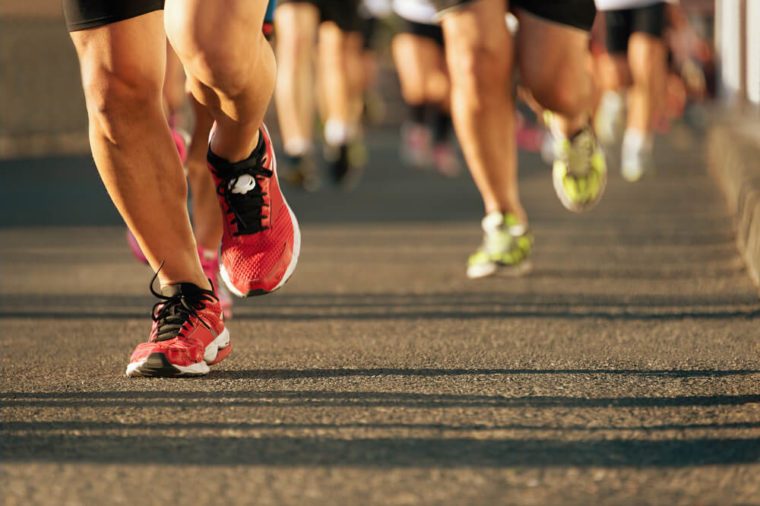 PAVEL1964/SHUTTERSTOCK
PAVEL1964/SHUTTERSTOCK
Running, particularly on roads, has been blamed for wear and tear on the knees, which can lead to osteoarthritis. But a new study shows that those who run regularly are actually less likely to develop the condition than those who don't.
It seems that running can strengthen the cartilage around the knee, preventing degeneration. Researchers at Monash University in Victoria, Australia, followed 300 adults, age 50 to 79, over a decade and found that cartilage volume increased in those who exercised the most.
Regular running can also reduce pain: A study at California's Stanford University found that older people engaging in regular exercise, including running, reported 25 percent less musculoskeletal pain than did sedentary people.
So does this mean people with osteoarthritis can run? Yes! While the safest option for people with joint problems is to take up a lower-impact exercise such as swimming, walking or cycling, according to Laurie Hurley of The Arthritis Society in Toronto, "runners without joint problems who train well, run regularly and watch their weight can demonstrate a lower likelihood of developing osteoarthritis than those who don't exercise at all."
BUT WATCH OUT! Make sure the shoe fits. Physiotherapist, triathlete and nationally ranked runner Cheryl Murphy of Victoria, B.C., says the most important thing for avoiding injury is a good pair of running shoes, fitted by an expert. It's also important to listen to your body and start out slowly. "Most people," says Murphy, "should start with a walk/run program."
Dairy—fat or no-fat?
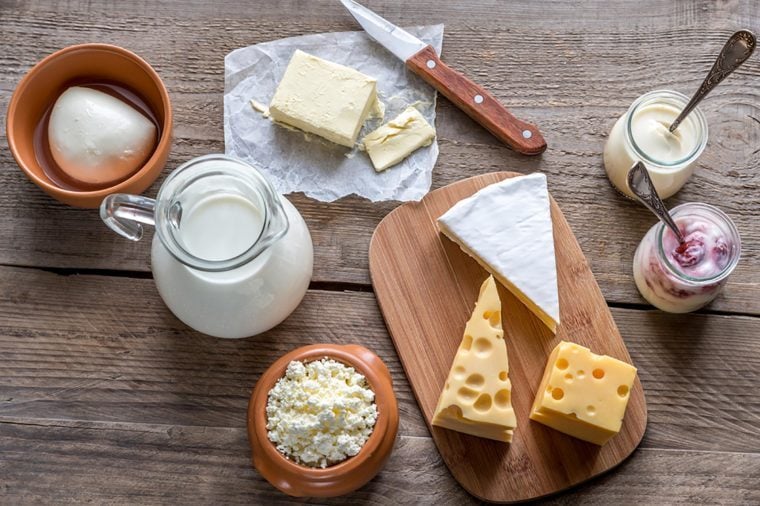 ALEXANDERPROKOPENKO/SHUTTERSTOCK
ALEXANDERPROKOPENKO/SHUTTERSTOCK
If you've trained yourself to touch nothing but low-fat or no-fat, you might want to relax.
A Harvard University study of nearly 19,000 women reported that high intake of low-fat dairy foods was associated with a greater risk of anovulatory infertility (infertility caused by the lack of ovulation), while intake of high-fat dairy foods was associated with a lower risk. "Dietary fat, in moderation, is essential to health," says Maria Kalergis, a registered dietitian with Dairy Farmers of Canada. "Women who restrict fat too much may not consume enough calories to support an optimal level of body fat, which is necessary for the production of many compounds, including hormones, that are involved in ovulation and fertility."
A Harvard University study of nearly 19,000 women reported that high intake of low-fat dairy foods was associated with a greater risk of anovulatory infertility (infertility caused by the lack of ovulation), while intake of high-fat dairy foods was associated with a lower risk. "Dietary fat, in moderation, is essential to health," says Maria Kalergis, a registered dietitian with Dairy Farmers of Canada. "Women who restrict fat too much may not consume enough calories to support an optimal level of body fat, which is necessary for the production of many compounds, including hormones, that are involved in ovulation and fertility."
In a long-term study of 2,375 men, researchers in Wales found that those who consumed the most dairy were about 60 percent less likely to develop "metabolic syndrome." This is a cluster of symptoms, such as high blood pressure and elevated blood-lipid and glucose levels, that can lead to diabetes, heart disease and stroke.
BUT WATCH OUT! High-fat dairy is only going to have these benefits if it is part of a balanced diet. Basically, if you eat too many calories, you'll put on weight.
Texting, not talking
 YUTTANAHONGSTANSAWAT/SHUTTERSTOCK
YUTTANAHONGSTANSAWAT/SHUTTERSTOCK
You may see text messages as another nail in the coffin of face-to-face human interaction. But a 2008 survey commissioned by Samsung Telecommunications America, in Dallas, found that 53 percent of teen respondents and 51 percent of parent respondents felt that text messaging improved teen-parent relationships.
Texting allows kids to stay in touch without feeling that their parents are intruding too much into their lives, says Arlene Moscovitch, who wrote a paper on electronic media for The Vanier Institute of the Family, in Ottawa. "It meets that balance between the kids' right to privacy and the parents' wish for connection," adds Moscovitch, who is also a consultant and media educator.
BUT WATCH OUT! Texting adds a level of anonymity, says Andy Nulman, president of Airborne Mobile, a Montreal-based mobile-phone-technology company. Kids can say they're at school when they're not, and parents can't question teens' whereabouts based on background noise, such as loud music. "The saviour to family communications," he says, "is a family communicating."
Start doing these easy habits that help you live longer.
Caffeine
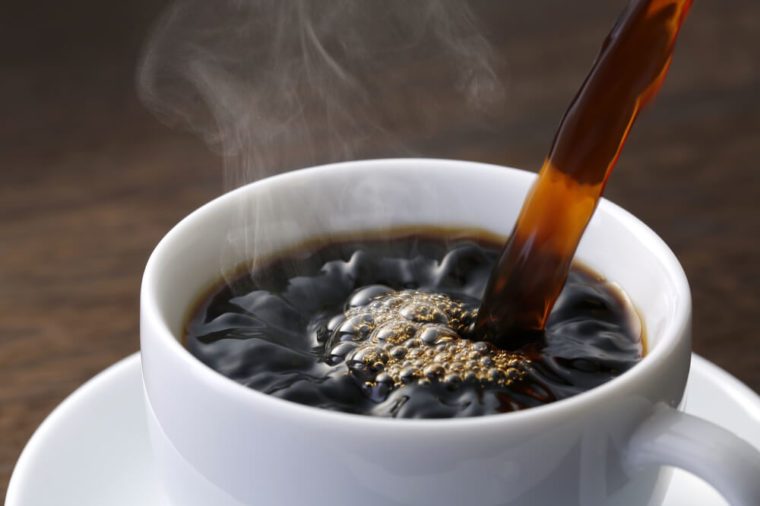 NOBUHIRO ASADA/SHUTTERSTOCK
NOBUHIRO ASADA/SHUTTERSTOCK
Many assume that decaffeinated coffee and tea is somehow healthier—and there have been suggested links between caffeine and heart palpitations and pancreatic cancer. But there's growing evidence that caffeine might actually be good for you.
A number of studies have flagged coffee as combatting or delaying the development of Parkinson's disease in men. "It's pretty well established that it's the caffeine," says Dr. A. Jon Stoessl, Professor & Head, Neurology, Department of Medicine Co-Director, Djavad Mowafaghian Centre for Brain Health. Although doctors don't prescribe coffee to Parkinson's patients, Stoessl believes caffeine may be helpful to those whose blood pressure drops substantially because of their illness, and sometimes advises these people to drink a caffeinated beverage with their meals.
Other studies have suggested that caffeine can help prevent gallstones; may reduce the risk of Alzheimer's disease (by 31 percent, according to one study); and can enhance athletic performance.
BUT WATCH OUT! Aim for a maximum daily intake of 400 milligrams of caffeine for adults (about three cups of coffee); and for women of childbearing age, 300 milligrams maximum (just over two cups), since caffeine may increase the risk of miscarriage.
Being a working mom
 UBER IMAGES/SHUTTERSTOCK
UBER IMAGES/SHUTTERSTOCK
Do you sometimes worry that the stress of caring for a family while holding down a job will drive you into the madhouse or an early grave? Fear not. Researchers at the University of Saskatchewan found that those in the triple roles of marriage, motherhood, and career were significantly less likely to report poor health than those with only one or two roles. Data indicates that triple-role women were also less likely to report the presence of potentially life-threatening chronic illness such as emphysema, diabetes and heart disease; and less serious chronic illness such as allergies, migraines, and ulcers. A similar study conducted in Britain found that 38 percent of long-term homemakers were obese by their 50s, compared with just 23 percent of women who had been working mothers.
BUT WATCH OUT! Sadly, the benefits don't come from going it alone. A Medical Research Council study in Britain found that single working mothers were less healthy than ones with partners or childless women—though still healthier than moms who didn't work.
Adopting these everyday habits will make you look WAY younger.
Sunshine
 OLEG GAWRILOFF/SHUTTERSTOCK
OLEG GAWRILOFF/SHUTTERSTOCK
For years, health-care authorities have warned us about the sun's damaging effects. But researchers are increasingly finding that sunshine, in moderation, can be beneficial. We know that sunlight prompts our bodies to produce vitamin D, which helps develop and maintain strong, healthy bones. Recent studies, however, strongly indicate that vitamin D also helps prevent colorectal, breast and prostate cancers, as well as autoimmune disorders such as multiple sclerosis and Type 1 diabetes.
In the summer months, most of us produce adequate vitamin D just by going about their everyday activities, says Dr. Cheryl Rosen, a dermatologist and director of the Canadian Dermatology Association's Sun Awareness Program for the Prevention of Skin Cancer. But many of us in the Northern Hemisphere don't get enough of the "sunshine" vitamin in the fall and winter, since the sun's rays are too weak to help us generate much of it. The society recommends that adults, in consultation with their health-care providers, consider taking a 1,000 IU vitamin D supplement every day during the fall and winter months.
BUT WATCH OUT! UV rays have a dark side. Skin cancer and melanoma, its most dangerous form, can be deadly. Get no more than a few minutes of daily sun exposure. Use sunscreen with an SPF of 15 or more, cover up or stay in the shade between 11 a.m. and 4 p.m.
Sugary soft drinks
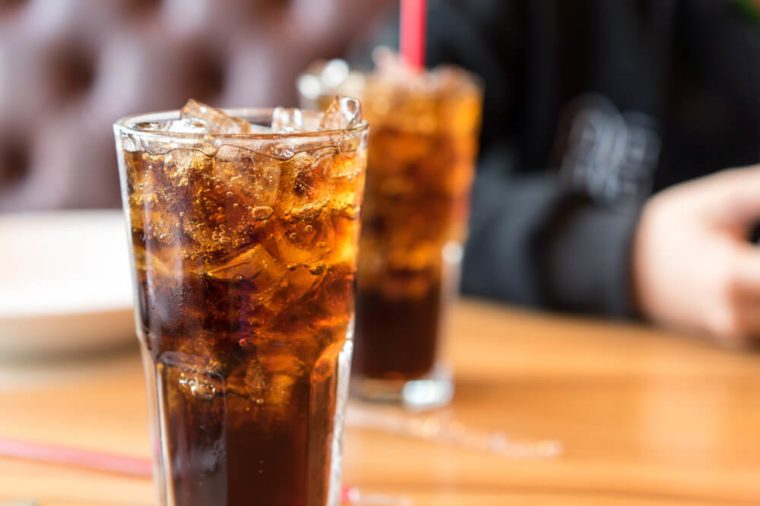 KIATTISAK LAMCHAN/SHUTTERSTOCK
KIATTISAK LAMCHAN/SHUTTERSTOCK
Surely it's great that soft drinks come in diet form? The same drink with virtually no calories. But a 2005 study from the University of Texas found that in a group of 622 participants studied over eight years, those who regularly drank diet soft drinks were far more likely to become overweight than those drinking the same amount of non-diet drink.
Diet soft drinks may lull you into a false sense of security. Animal experiments indicate that artificial sweeteners disrupt appetite control by breaking the conditioned association between sweetness and calorie intake. In such cases, the response is to increase calorie consumption, which leads to weight gain.
BUT WATCH OUT! It's better to hydrate with water, according to Halifax-based dietitian Jennifer Grant Moore. A can of regular soda contains a lot of empty calories.
Booze
 MOOED ART/SHUTTERSTOCK
MOOED ART/SHUTTERSTOCK
It's well known that red wine in moderation helps protect against heart disease, but the healing benefits of drink don't stop there. If you're a beer aficionado, take heart: Studies in both the Netherlands and the Czech Republic have discovered that the rich vitamin B6 content in beer can prevent the buildup of homocysteine, an amino acid, high levels of which have been linked to heart attacks. Beer also contains poly-phenols—which, in wine, are lauded for controlling LDL cholesterol.
BUT WATCH OUT! While there is some evidence that drinking moderately may lower the risk of heart disease and stroke, the Heart and Stroke Foundation says: "If you don't drink, don't start." If you do drink, the foundation suggests no more than about one drink a day for women and no more than two a day for men.
These are the daily habits of lucky people that you'll want to start doing right now.
- লিঙ্ক পান
- X
- ইমেল
- অন্যান্য অ্যাপ
মন্তব্যসমূহ
একটি মন্তব্য পোস্ট করুন